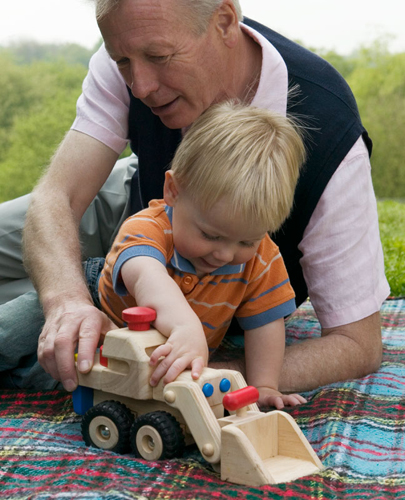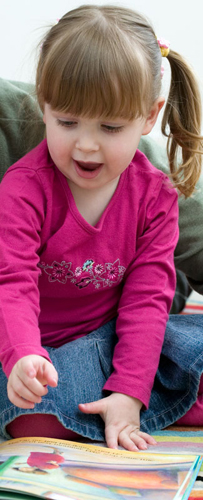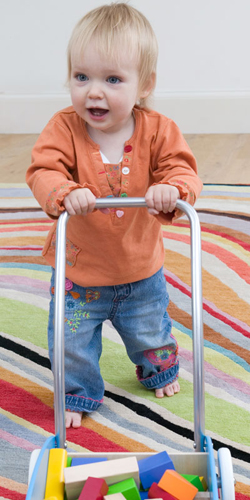All young creatures learn through play, and children
are no exception. Toddlers are naturally curious and will interpret
their world using all their senses, learning all the time from their
experiences. Their instinct for discovery is naturally expressed through
playfulness and doesn’t need to be forced.
“There is a time for
directed play (leading your child to follow your instructions), but
children must be allowed to explore and learn from experience, too.”
Children are amazing. They
think of the most extraordinary things and have so much to say, but to
truly understand them, we need to give them our time. Playtime is your
toddler’s route to rehearsing life’s survival skills, and is also the
perfect time for you to get to know each other better. Play at this age
needs a lightness of touch and should be a time of great fun and
laughter. A toddler’s brain has not yet developed enough to understand
complex instructions and explanations (see Stages of brain development). Simple guidelines and easy outcomes will be enough to stimulate interest.
Playing with your
child regularly will help you get to know her in a deeply intimate and
instinctive way that will serve your relationship well for life—it is
essential for her development.
Play will help your child to:
Develop imagination and nurture creativity.
Try new things and develop self-confidence.
Manage emotions (in a safe environment), by experiencing frustration, success, disappointment, and enjoyment.
Develop problem-solving skills and reasoning ability.
Build physical strength and competence.
Develop motor skills, such as coordination, movement, and balance.
Develop
cognitive skills, such as planning, problem solving, memory, and
testing a theory—for example, “If I hide teddy, will he still be there
later?”
Develop social skills and eventually develop friendships.
Encourage language development.
Parents are often
surprised when they learn that the solution to their toddlers’ behavior
problems is to increase the amount of time they play with them. Little
ones of this age are very attached to their parent figure—you are likely
to be their favorite playmate—and will do anything to gain attention,
even if the attention is negative. The advantage of playtime is that a
child does not need to “act out” to get quality attention.
Learning from grandad
Your own parents may have more time than you to play with your
toddler. This level of attention can lead to a very special bond
developing between grandparents and grandchildren.

Bookworm
Picture books help language development, reinforce memory, and
stimulate the imagination. Your child will love to look at the same
pictures again and again.

Getting stronger
Energetic play is physically demanding, so it’s great for tiring
out your lively toddler, and it will strengthen her muscles and keep her
body healthy.

Where does play stop and learning begin?
So, why do children play,
and exactly what purpose does it serve? For a child, it is probably
obvious: children play for the sheer joy of it! They love freedom of
movement, fun and laughter, imagining things, making new discoveries,
and the feeling of being secure in their environment. The boundary
between exploration and play is indefinable, and children will generally
learn new skills and information far more easily if they are enjoying
the task and thinking of it as playtime.
Play is about much more
than “pretending”; it is about exploring and learning new skills vital
to physical and emotional health. Play teaches that communication can be
fun and motivates children to learn to communicate in other ways, too.
It is through play that children first come to understand that objects
can represent other things (for example, an empty packing box can become
a boat, a house, a car). The ability to make associations and to use
imagination is at the heart of learning language.
Types of play
Different styles of play are vital to encourage gross and motor skill development and to encourage creative, social, mental, physical, and imaginative development:
Mental play
Your child’s cognitive skills
develop through mental play. This includes language play, number
rhymes, songs, and playing with different shapes and textures. Preschool
children have a wonderful sense of the absurd, but their understanding
of word play and humor evolves over time.
Creative play
This involves your child’s fine motor skills and includes activities such as drawing, painting, sticking things,
model building, and playing with play-doh and construction toys. This
kind of play works wonderfully in partnership with the skills needed for
mental play to help your child understand the connections between sounds and words and pictures.
Physical play
Movement helps the body
and brain to develop normally. The patterns that are put in place now
will have an impact on your child’s development and metabolism for life.
Running, jumping, walking, climbing, hopping, and play fighting are all
examples of physical play. Swimming is also an appropriate form of play
from an early age. Children who do not get enough exercise and
stimulation through play will look for it elsewhere, by running around
the house or “acting out.”
Imaginative play
Children age three and
upward have fertile and boundless imaginations. They can transform
themselves into a “character” in an instant, will love to dress up, and
may find the boundaries between fantasy and reality hard to distinguish
on occasion. Imaginative play is closely linked to role play. Your child
will love to copy those around her, especially the significant adults
in her life, and will also be influenced by any older siblings, and
other strong characters. Like many parents, you may at some point be
embarrassed to hear your own words and behavior echoed by your young
toddler! Early role play is at the root of learning important social and
life skills.
Social play
Through play your
child will learn to cooperate and empathize with others. Play develops
instinctively and spontaneously and leads to the development of
essential skills that she needs for socialization and survival in later
life. The good news is that playtime provides many of the things that
your adult brain needs, too. All too often we forget how to relax and
have fun when overwhelmed by the stresses and strains of everyday
life—so give yourself a break and reconnect with your own childhood
playtime as you unwind with your toddler.